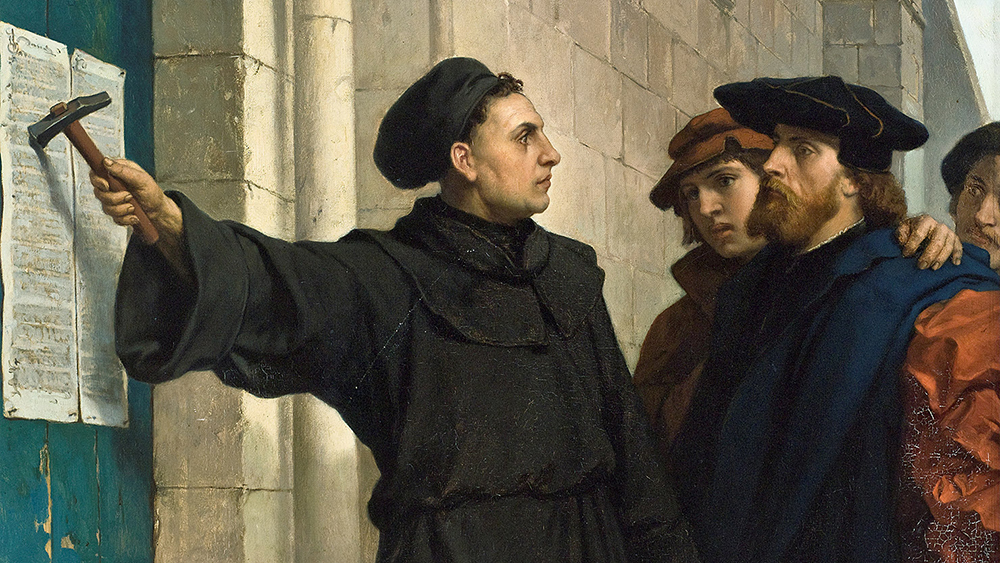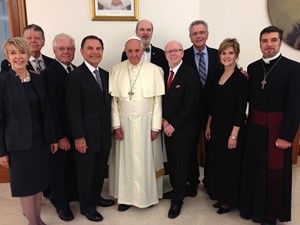In 1405, Pope Innocent demanded that John Huss stop his “heretical” stand against the Catholic doctrine that only a priest could read the Word of God. Huss preached that man should not need a priest to digest the Bible for him, but he should have the right to read and understand it for himself. Huss was also ordered to stop his protest of the selling of indulgences, and recant of his words against the pope. The man of God stood his ground, and was sentenced to the same fate as tens of millions who were murdered simply because they protested the hierarchy of power that is called the Roman Catholic Church.
On that fateful day, Huss stood strapped to the stake, surrounded by bundles of wood. The executioner bent down to light the fire and said, “Now we will cook the goose.” (Huss means goose in Bohemian). The man of God responded with this prophecy, “Yes, but there will come a swan in 100 years who you will not reach.”
About a hundred years later, a Catholic Priest named Martin Luther saw the grave errors of the Roman Church, and began preaching that the Message (Bible) should be available to the common man, in his common language. As Huss did, he preached against indulgences and defied Catholic dogma by preaching justification by faith. He denied the infallibility of both the clergy and the pope, placing his trust in the Bible only. His words cut to the very heart of the Roman establishment. Then, on October 31, 1517, Luther nailed his 95 Theses to the door of Castle Church in Wittenberg, Germany. The Protestant Reformation had begun.

Luther quickly went to work translating the Bible into German. At the same time, another servant of God named William Tyndale began the English translation. More and more language translations started to materialize. Even the enormous power of the church could not stop the Message from reaching the people. It wasn’t long before the common man did not have to rely on his priest to spoon-feed him doctrines of the church. To the dismay of the clergy, even a lowly peasant could read the Word for himself and judge the errors he was being taught from the pulpit.
Today marks 500 years since that fateful morning when Luther started the Protestant Reformation. It dealt a powerful blow to Satan’s kingdom, but the devil was far from finished. He knew that it would only be a matter of time before Luther would pass from the scene and the denominational spirit would once again rule.
In both the Philadelphia and Laodicea ages, Satan slowed his murderous ways to lull the people into a false sense of security. However, we can see the antichrist spirit throughout history, and it would be foolish to think that those times are over. The world should never forget that Satan is still a murderer, and the Roman ideology is as powerful today as it has ever been.
Here are a few things that have been going on lately.
In 1999, the Lutheran and Roman Catholic churches signed a joint declaration, trying to end the 500-year Protestant Reformation. Among other things, the agreement stated that the two churches now share “a common understanding of our justification by God’s grace through faith in Christ.” The two churches said that this essentially “resolves the 500-year old conflict over the nature of justification, which was the root of the Protestant Reformation.”
Martin Luther would roll over in his grave.
Luther protested indulgences, the authority of the pope, the authority of the church, and about 90 other things besides “justification by works.” However, sadly, the recent political ploy worked.
In the spirit of ecumenicalism, the World Methodist Council and other denominations whole-heartedly swallowed the poison set forth by the CathoLutherens and began to overlook their differences. Pope Francis championed the cause by teaming up with many so-called charismatics to further what was started in 1999.

Tony Palmer (right) and other church leaders standing with the pope.
In February, 2014, an Anglican Episcopal bishop named Tony Palmer addressed Kenneth Copeland and leaders of the charismatic movement about ending the Protestant reformation. Mr. Palmer made the following statement: “Brothers and Sisters, Luther’s protest is over. Is yours?” He then played a recording from the pope, which was accepted with a standing ovation. Tony Palmer was tragically killed in a motorcycle accident a few months later, but his message is gaining steam.
On July 23, 2015, the Catholic Herald news organization (a flagship for the Catholic Church) posted an article titled, The Pope’s Great Evangelical Gamble. The article started in this way:
Somewhere in Pope Francis’s office is a document that could alter the course of Christian history. It declares an end to hostilities between Catholics and Evangelicals and says the two traditions are now “united in mission because we are declaring the same Gospel”. The Holy Father is thinking of signing the text in 2017, the 500th anniversary of the Reformation, alongside Evangelical leaders representing roughly one in four Christians in the world today.
Francis is convinced that the Reformation is already over. He believes it ended in 1999, the year the Catholic Church and the Lutheran World Federation issued a joint declaration on justification, the doctrine at the heart of Luther’s protest.
We don’t know if the document was signed today or not, but it doesn’t really matter. We can all see the direction the church is moving.
On October 31, 2016, pope Francis traveled to Sweden (historically, a champion of Protestantism) to celebrate Luther’s Reformation and continue his public plea for unity. CBS News published an article and said the following:
“Pope Francis traveled to secular Sweden on Monday to mark the 500th anniversary of the Protestant Reformation, a remarkably bold gesture given his very own Jesuit religious order was founded to defend the faith against Martin Luther’s “heretical” reforms five centuries ago.”
Francis’s efforts have the appearance of compromise, but it is purely political. The Catholic Church does not compromise; it never has and it never will. Its purpose is to dominate both lives and souls of men, and it uses political prowess to do this. Churches are far too willing to forget what we have come through over the past 2,000 years and where the persecution started: The Catholic Church.
In 325 AD, the Roman Emperor Constantine used the same tactics as Pope Francis to lure the people into a trap of “unity.” The seemingly innocent White Horse Rider then took up his bloody sword at the Nicene Council and killed tens of millions of Christians. That spirit is still among us. The denominational world may fall for it, but the Bride will never be deceived, and we will never forget.
The prophet warned us of these times. His Message was “Come out of her, my people that ye be not partakers of her sins.” It’s a far cry from “make some concessions so we can be one united church.” Yes, the Bride is united under the Word, and by that same Word, we know our enemy. We will never forget what Martin Luther stood for.
May God bless you on this 500-year anniversary of Reformation Day.
Click here to read last year’s Halloween article.